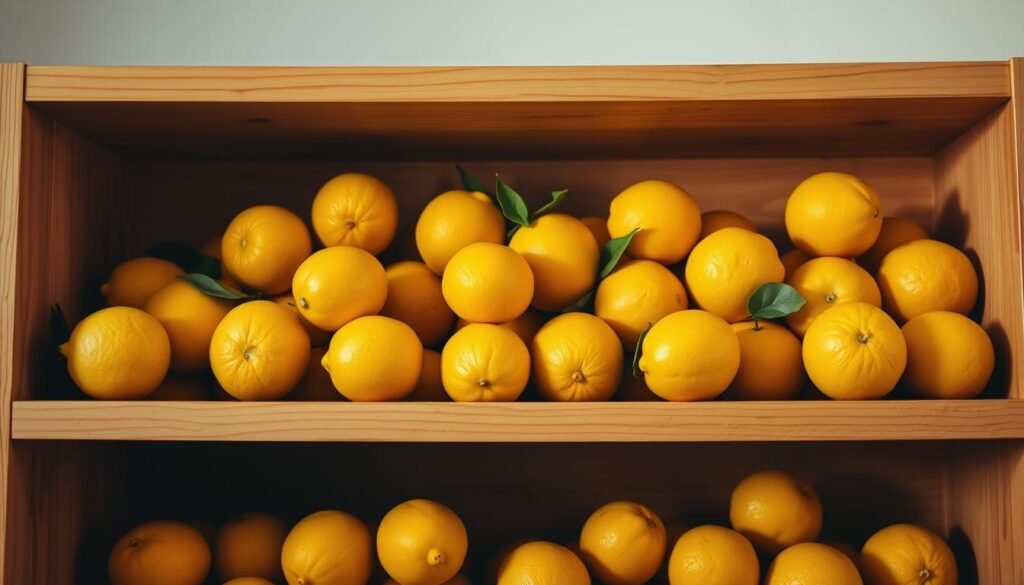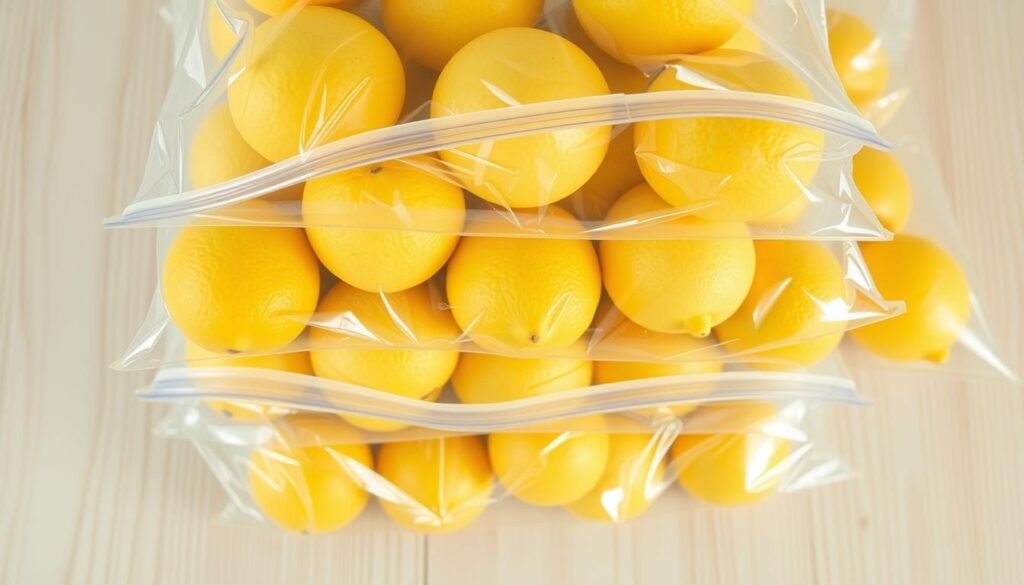In my kitchen, lemons and limes are must-haves. They add zest to vinaigrettes, tang to marinades, and a burst of flavor to grilled fish. But, mishandling can make them lose their brightness in days.
Through trial and error, I’ve found ways to keep their flavors bright and their texture firm. These tips turn simple storage into a science. This way, every lemon and lime can shine in your dishes.
Key Takeaways
- Proper citrus storage extends shelf life and protects flavor.
- Refrigerator tips like humidity control and smart packaging maximize freshness.
- Preserve lemons by avoiding moisture buildup to prevent mold.
- Extend citrus life using methods inspired by culinary traditions.
- Smart storage ensures consistent quality for juices, zests, and garnishes.
Whether making a margarita or a zesty salad dressing, bad citrus can kill the vibe. This guide shares my top tips to keep lemons and limes fresh. You’ll learn how to make them last longer, so they’re always ready to use.
Why Proper Citrus Storage Matters
Every time I’ve found shriveled lemons in my pantry, I feel regret. It’s not just for the wasted fruit, but for missing their vibrant taste. Proper lemons storage importance is more than practical; it’s a fight against waste and a love for flavor. Let’s explore how our choices today affect our citrus’s journey from market to plate.
Preventing Food Waste and Saving Money
Imagine cutting into a citrus that’s juicy instead of dry. Prevent lemon waste by storing them right. This turns potential waste into ingredients for salads or cocktails. Every preserved lemon saves money and helps the planet.
Maximizing Flavor and Nutrient Retention
Lemon nutrients like vitamin C and oils are hidden under their peels. If stored wrong, they lose their zest. Good storage keeps their flavor and nutrition, making every squeeze or zest count.
Extending Citrus Shelf Life Through Proper Storage
Learning about citrus shelf life can make your pantry last months. Knowing how temperature and humidity affect them is key. It’s not just keeping them fresh; it’s showing respect for the orchards and meals to come.
Understanding the Shelf Life of Lemons and Limes
There’s a delicate dance between time and freshness with citrus. Over years, I’ve studied the lemon shelf life and lime freshness duration. I’ve found patterns that turn guesswork into strategy. The right storage can make fleeting flavor last longer.

Room Temperature Lifespan
At room temperature, lemons keep their zest for about a week. Limes, however, lose their peak in 3–5 days. Their skins get stiff, and juice retreats.
This method needs daily checks to catch their prime.
Refrigerated Lifespan
Chill them, and their citrus storage timeframe gets longer. Chilled lemons last 3–4 weeks; limes last 2–3 weeks. This refrigerated citrus lifespan depends on avoiding condensation.
Cold slows decay without freezing their vivacity.
Factors Affecting Citrus Freshness
Humidity plays a big role. A fruit’s origin and maturity also matter. Winter citrus, harvested at peak ripeness, lasts longer than summer varieties.
Consistent coolness is key—fluctuations speed up decline. Even how they’re handled matters: bruised skins invite spoilage.
Pairing freshness with creativity, I freeze extra citrus zest. This preserves their essence for future dishes like my zesty herb and citrus marinade. Every storage choice is a step toward enjoying their brightness.
The Ideal Refrigerator Conditions for Lemons
My quest for the best way to store lemons started with finding the right balance of temperature and humidity. The optimal lemon storage temperature is between 40°F and 48°F (4°C–9°C). This range keeps their zest alive without freezing them.
In my kitchen, the citrus crisper drawer is where lemons find peace. I adjust the humidity to medium-high. This keeps them moist but prevents mold.
I make sure to keep lemons away from the freezer. This stops them from losing their juice to cold. The refrigerator humidity for lemons is also key. A dry drawer can dry out lemons quickly.
Here’s how I keep them fresh:
- Place lemons in the citrus crisper drawer, away from apples or bananas.
- Adjust humidity controls to medium-high, like their natural environment.
- Rotate them weekly to ensure even preservation—like tending a small grove.
For a burst of freshness, try this herbed citrus marinade to elevate meats or veggies with stored lemons. Their crispness and aroma, maintained through mindful lemon refrigeration, make all the difference. Every time I open the drawer and find plump, bright citrus, I’m reminded: patience and precision turn ordinary lemons into pantry treasures.
To Bag or Not to Bag: Packaging Options for Citrus Storage
Preserving citrus’s vibrant essence is a passion of mine. I’ve learned the importance of the right citrus packaging methods. The right choice can turn a zesty burst of flavor into a shriveled disappointment.
| Option | Pros | Cons |
|---|---|---|
| Mesh bags | Excellent airflow prevents mold; eco-friendly and reusable | Risk of drying out in fridge humidity extremes |
| Plastic vs mesh for lemons | Plastic bags with ventilation holes retain moisture better than sealed options | Potential for condensation buildup if not perforated |

My tests showed mesh bags are best for keeping lemons fresh on the counter. But in the fridge, I now use perforated lemon storage bags. For longer storage, airtight lemon containers like Pyrex glass boxes are my top choice. They protect against ethylene gas and physical damage.
Keeping moisture in check is crucial, even in containers. I use a simple trick: lining airtight lemon containers with a single layer of paper towel lemon storage. This absorbs condensation without drying out the fruit.
These methods are more than just techniques; they’re a way to show love for citrus. Each choice is a step towards preserving the fruit’s journey from tree to table.
The Water Method: A Surprising Way to Keep Citrus Fresh
Imagine lemons and limes that stay crisp and fragrant for weeks. Their vibrant hues remain unchanged. This submerged citrus storage technique is my secret to keeping citrus fresh. By placing whole fruits in a glass jar with cool water and refrigerating them, I’ve found a simple yet powerful way to preserve citrus.
The science behind it is beautiful. Water acts as a shield against oxygen, stopping the browning process. It also keeps moisture in. My tests showed that lemon water preservation technique works best when fruits are perfect and fully submerged. After sealing the jar, changing the water every 5–7 days keeps it effective, washing away compounds that could harm texture.
The trick is to use room-temperature water and citrus to avoid shocking them. Submerged citrus storage is especially good for lemons, whose thicker rinds don’t absorb water as much as limes. This way, Fresh lemons in water stay fresh and aromatic for up to a month. They’re perfect for morning juice or a zesty cocktail.
While it needs a bit more care, the citrus water method is worth it. Every time I take a lemon from its water, I’m reminded of the joy of discovery. It shows how a simple jar can keep nature’s tangy essence alive for our next culinary adventures.
Whole vs. Cut: Different Storage Approaches for Lemons and Limes
There’s a big difference between a whole lemon and a cut one. I’ve learned to treat them differently. It’s all about using the right method for each.

| Whole | Cut |
|---|---|
| Store in mesh bags or breathable containers | Seal cut surfaces with beeswax wrap |
| Maintains natural oils longest | Risk of oxidation increases rapidly |
| Keeps 2-3 weeks refrigerated | Use within 3-4 days for peak quality |
For cut lemon storage, I place halves cut side down on a plate. Then, I cover them with a bowl. This keeps them moist without mold. For lemon juice, I freeze it in ice cube trays. Each tray gets a date to keep track of freshness.
- Freezing lemon zest: Grate zest first, spread on parchment, then transfer to airtight containers for frozen lemon zest
- Whole vs. sliced lemons: Whole fruits keep their scent longer; sliced ones need tight seals to stay moist
- Half lemon storage techniques: Use glass containers with damp paper towels to keep them humid
By separating parts, we can use them better. Preserving lemon juice lets me add summer flavors to winter dishes. And choosing how to store lemons respects their purpose. Every citrus deserves the right care, whether for drinks or desserts.
Signs Your Citrus Has Gone Bad
Spotting spoiled lemons signs early keeps your citrus fresh and safe. Use your senses—vision, touch, and smell—to spot moldy lemon identification and citrus spoilage indicators. Here’s how to read the signs:
- Visual Cues: Look for bad lemon symptoms like fuzzy white or black spots—these signal mold penetration. A dull, brown-tinged rind versus vibrant yellow is another red flag.
- Texture Tests: Press gently. If it feels mushy or overly firm, the cells have either broken down or dehydrated beyond rescue.
- Aroma Alerts: Fresh citrus smells bright and zesty. A sour wine-like odor means fermentation has begun.
| Indicator | Action |
|---|---|
| Fuzzy mold patches | Discard immediately |
| Sunken, wrinkled skin | Use zest only if unmarred |
| Fermented scent | Do not consume |
| Blackened pith | Dispose entirely |
Trust your instincts with when to discard lemons. If any of these signs appear, choose safety over sentiment. My kitchen rule? It’s better to throw away a lemon than risk a spoiled dish or an upset stomach. Observe, assess, and act quickly to keep flavor and peace of mind.
Common Mistakes That Reduce Lemon and Lime Freshness
Years of kitchen experiments showed me how citrus can lose its zest. These lemon storage mistakes often come from bad habits. Like not storing them right or ignoring the importance of humidity. Let’s uncover the mistakes to keep your citrus fresh.
Temperature Fluctuations and Their Impact
Switching between warm and cold is a big improper lemon refrigeration mistake. Each change stresses the rind, leading to decay. Keep them in one place, like a crisper drawer, to save their zest.
Moisture-Related Storage Errors
Moisture damage to lemons can start with rinsing them before storing. This traps moisture against the peel. Dry them well before putting them in a breathable mesh bag. Wrapping too much can trap moisture, causing mold that spoils both zest and juice.
Cross-Contamination Concerns
Contaminated citrus storage happens when lemons are near foods that release ethylene gas, like apples or avocados. Even a little dirt from unwashed hands can introduce bacteria. Store them alone, wrapped in paper towels to absorb moisture. Use tongs if your hands are wet.
| Mistake | Solution |
|---|---|
| Temperature swings | Designate a fridge spot far from door drafts |
| Excess moisture | Air-dry after washing; use mesh bags |
| Ethylene exposure | Isolate from bananas, onions, or overripe fruits |
Beyond the Refrigerator: Alternative Storage Methods
When the fridge is full, we turn to old and new ways to keep lemons fresh. Salt-preserved lemons, a tradition from North Africa, make lemons into savory treats. I soak whole lemons in salt and their own juice, letting them ferment in a cool spot.
The results are amazing: soft rinds and a milder taste. They make grain salads and marinades even better.
“The salt’s embrace coaxes flavors no fresh lemon could muster,” whispered my grandmother, who taught me this ritual.
Dehydrated lemon slices are another option: thin slices dried in a dehydrator or oven at 170°F become crunchy. These citrus preservation techniques add a burst of flavor to stews or can be ground into zesty powders. I also can lemon segments in syrup, keeping their bright flavor in mason jars.
Even lemon zest and juice can be frozen into “flavor cubes” for sauces later.
- Salt-preserved lemons: A labor of patience yielding briny complexity.
- Dehydrated lemon slices: Crisp, concentrated bursts of citrus in 8 hours.
- Infused oils: Zest steeped in olive oil gifts golden elixirs for dressings.
These lemon storage methods keep traditions alive while encouraging new ideas. A jar of preserving lemons sits in my pantry, a tribute to Moroccan markets and my grandmother’s kitchen. Each method connects the past to the present, keeping citrus’s essence alive long after it’s picked. By experimenting, we turn simple lemons into something special, showing that preservation is both art and science.
Conclusion: Getting the Most from Your Lemons and Limes
Maximizing lemon freshness starts with making small changes. Simple steps like controlling fridge humidity or using paper towels can make a big difference. These tips turn storing lemons into a way to care for them, keeping their flavor alive for weeks.
By following these best practices, you’re not just keeping lemons fresh. You’re also connecting more deeply with the ingredients you use. Every method, from freezing juice cubes to sealing zest in oil, is a way to cook with care.
These techniques help honor the orchards where lemons grow and the people who pick them. They guide your cooking, whether you’re making winter mocktails or reviving dried rinds. The fridge and airtight containers become your allies in keeping their flavor strong.
As you get better at these practices, your kitchen becomes a place where every citrus note is celebrated. It shows that careful storage is key to making dishes that are full of care and thought.


